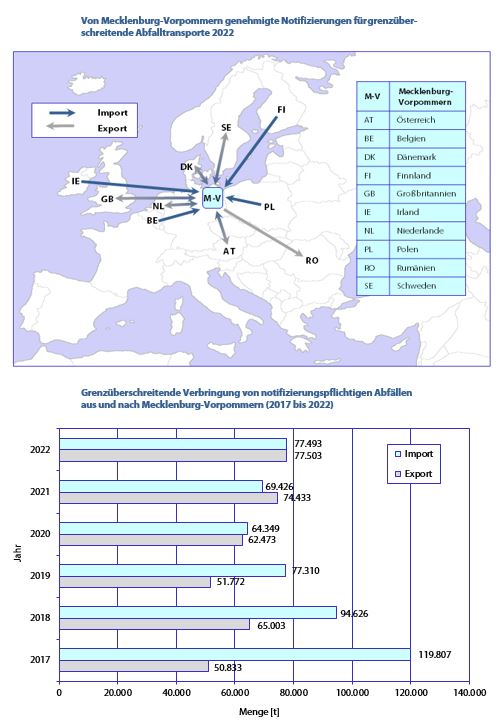

Landesamt für Umwelt, Naturschutz und Geologie
Transboundary waste shipments
Legal bases
Transboundary waste shipments in Germany and in other EU countries are governed by Regulation (EC) No. 1013/2006 on shipments of waste (abbreviated VVA).
The VVA is used to implement international obligations, particularly under the Basel Convention of 1989 on the control of transboundary movements of hazardous wastes and their disposal and the decision of the OECD Council on the control of transboundary movements of wastes destined for recovery operations.
The VVA has been applied since 12th July 2007. It supersedes Regulation (ECC) No. 259/93 previously in force. The German Waste Shipment Law complements the directly applicable EC regulation at the German level.
All pertinent legislation is provided for download on the web site of the Federal Ministry for the Environment, Nature Conservation, Nuclear Safety and Consumer Protection (BMUV).
Supervision and control of waste shipments
The shipment of wastes into other countries is subject to variously strict requirements depending on which wastes are involved, which disposal methods are planned, and which countries are participating.
Non-hazardous wastes on the so-called “green list” (VVA Annexes III, IIIA, and IIIB), which are destined for recovery, are subject only to the “general information requirements” of VVA art. 18 within the EU. This means that a prescribed form (VVA Annex VII) must be brought along with each transport. Moreover the person who arranges the shipment and the consignee must conclude a contract concerning the recovery before beginning the shipment.
Special rules are to be observed when exporting of green-listed wastes into non-EU states. These might make a notification necessary or prohibit the shipment entirely.
During a shipment within the EU, wastes for which a notification is required are subject to the procedure of “prior written notification and consent” (art. 4, VVA et al.). This means that before such wastes may be shipped transboundary, a notification request must be submitted to the authority of dispatch (notify = announce). The transport may take place only when all of the competent authorities consent to the planned shipment. All wastes for disposal, wastes for recovery on the socalled 'yellow list' (VVA Annexes IV and IVA), as well as all unlisted wastes and waste mixtures are considered subject to the notification obligation.
Special rules must be observed when wastes subject to the notification obligation are exported out of, or imported into the EU. Shipment prohibitions in particular apply for certain waste and countries.
Competencies
In Germany decisions concerning the export and import of wastes were transferred to the federal states (Waste Shipment Law, sec 14). The federal state authorities in whose jurisdiction the transport of the wastes begins are competent in the the case of export. Where the wastes are first destined to be recoverd or disposed of is decisive with export. The Federal Environmental Agency is responsible for transit through Germany.
The State Agency for Environment, Nature Conservation and Geology Mecklenburg-Vorpommern (Unit 540) has been responsible for transboundery waste shipments to and from Mecklenburg-Vorpommern since 1st June 2006.
Mecklenburg-Vorpommern waste amounts
A total of 77.493 t of wastes subject to the notification procedure was shipped to Mecklenburg-Vorpommern in 2022. Of this, 54.940 t were hazardous wastes. During the same time period, 77.503 t of wastes subject to the notification procedure were exported. There were 14.366 t hazardous wastes among these.
The two figures below illustrate the import and export of wastes subject to the notification procedure for our state. Figure 1 shows the countries for which the State Agency for Environment, Nature Conservation and Geology Mecklenburg-Vorpommern approved waste imports and exports in 2022. Wastes were not necessarily shipped with every notification. Figure 2 presents the waste amounts shipped in the years from 2017 to 2022.




